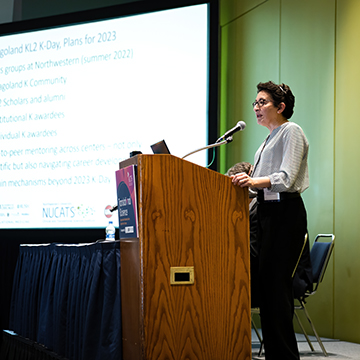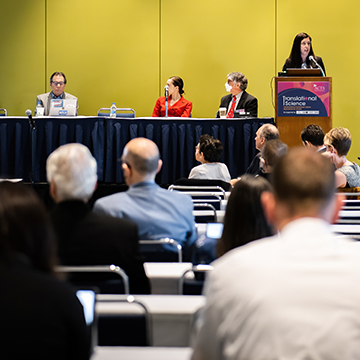Chicagoland Collaborations Take Center Stage at Translational Science 2022
“The benefits of working with our colleagues at the other Chicagoland CTSA hubs can’t be overstated,” says Northwestern University Clinical and Translational Sciences (NUCATS) Institute KL2 Director Leena Sharma, MD.
The concept of collective benefit was at the forefront of an hourlong presentation at Translational Science 2022, the annual meeting of the Association for Clinical and Translational Science (ACTS), held April 20-22 in Chicago.
The talk included representatives from Chicago’s three Clinical and Translational Science Awards (CTSA) Program hubs, as well as the Chicago Consortium for Community Engagement (C3), which includes the Chicago Department of Public Health.
The benefits of working with the other Chicagoland KL2 leaders and their teams can’t be overstated, especially for generating novel approaches, scaling up, and serving as near-peer mentors for each other.”

Under National Center for Advancing Translational Sciences (NCATS) leadership, the CTSA Program supports a national network of medical research institutions that work together to improve the translational research process to get more treatments to more patients more quickly. The hubs collaborate locally and regionally to catalyze innovation in training, research tools, and processes.
In Chicago, three hubs — The NUCATS Institute, Institute for Translational Medicine (ITM), and University of Illinois at Chicago Center for Clinical and Translational Science (CCTS) — frequently partner on initiatives, both large and small.
One such collaboration is The New Normal clinical research recruitment portal, which is an easy-to-understand, mobile tool matching interested individuals with applicable research studies. The New Normal has already connected more than 1,000 people with health research opportunities.
“The goal is to make health research accessible and approachable,” says Sara Serritella, ITM director of communications.
Chicago Consortium for Community Engagement
Founded more than a decade ago, the Chicago Consortium for Community Engagement (C3) helps bridge the gap between translational research discoveries and the clinical care that improves community and population health. Recognizing this, C3 took the novel step of creating a coordinator for research and evaluation position within the Chicago Department of Public Health (CDPH), a position that Rachelle Paul-Brutus has held since 2017. This position is co-funded by the three Chicagoland CTSA hubs. The consortium is comprised of community stakeholders including CDPH, AllianceChicago, Brenda Boyd (Greater Chatham Initiative), Michelle McCullough, Julius Mercer, Kristin Smith (Health & Medicine Policy Research Group), as well as Chicago’s three CTSA hubs. Paul-Brutus is co-chair of C3 alongside Marc Atkins of UIC.
“There are two unique advantages of C3. First, to our knowledge, we are the only city coordinating the efforts of three CTSA programs, especially related to community-based research,” says Atkins. “Second, we are among a small group of hubs working directly with our city’s health department.”
Atkins presented on C3 during the ACTS conference and highlighted numerous consortium accomplishments, including: the development of a NUCATS-CCTS dissemination and implementation science workshop; the inclusion of research-based questions in a city-wide survey completed by 4,000 people; and Healthy Chicago 2025 working groups that have helped define CDPH health priorities.
EQuaTR Conference
The momentum built by the Enhancing Quality in the Translational Research Workforce (EQuaTR) Conference can be seen in a single graph.
Presented by Nicole Masen, senior program administrator at the NUCATS Center for Education and Career Development, at Translational Science 2022, the chart showed the sharp increase in EQuaTR registration from 103 in 2016, to 402 last year.
It’s so amazing how representatives from all three hubs bring their experiences and knowledge and contribute to all of the work that goes into hosting an annual event like this.”

Each summer, an advisory board, composed of members from Chicago’s three CTSA hubs, begin discussing the following year’s spring conference, and how it can provide critical education for professionals in clinical and translational research.
“I cannot stress enough how proud I am to be a part of this wildly successful collaboration,” says Masen. “It’s so amazing how representatives from all three hubs bring their experiences and knowledge and contribute to all of the work that goes into hosting an annual event like this.”
Collaboration in education programming continues to lead to more collaboration between the hubs. The ongoing Clinical Research Workforce Excellence (CReWE) series has expanded to include numerous CTSA-wide presentations.
K-Program Success
The Multidisciplinary Career Development Program (KL2) is an NCATS-sponsored career development award supporting early-career faculty at each Chicago CTSA hub. The program is designed to train a diverse workforce of investigators to drive future innovation and implement effective clinical and translational research.
Leaders from each KL2 program discussed some of the phenomenal collaborations taking place in the Windy City, including science communications training and the annual KL2 K-Day, which brings together scholars and KL2 alumni from each institution.
“The benefits of working with the other Chicagoland KL2 leaders — Eric Beyer at ITM and Shane Phillips from CCTS — and their teams can’t be overstated, especially for generating novel approaches, scaling up, and serving as near-peer mentors for each other,” says Sharma.
ITM Director Julian Solway, MD, moderated the panel discussion at Translational Science 2022.
NUCATS, ITM, and CCTS are fueled by nearly $80 million from the National Institutes of Health (NIH) National Center for Advancing Translational Science (NCATS) Clinical and Translational Science Awards (CTSA) Program. The ITM is a partnership between the University of Chicago and Rush in collaboration with Advocate Health Care, the Illinois Institute of Technology (Illinois Tech), Loyola University Chicago, and NorthShore University HealthSystem.
Efforts are supported in part by the National Center for Advancing Translational Sciences of the National Institutes of Health through Grant Number UL1TR001422 that supports NUCATS; Grant Number UL1TR002389 that supports ITM; and Grant Number UL1TR002003 that supports CCTS.
Written by Roger Anderson




